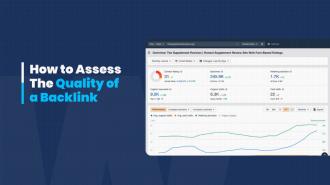Summary / TL;DR
Domain Authority (DA) is a ranking metric developed by Moz that predicts how likely a website is to rank on search engine results pages. Scored from 1 to 100, a higher value reflects stronger ranking potential based on link quality, relevance, and various technical SEO factors. Factors influencing DA include the number and quality of inbound links, website structure, MozTrust, and MozRank. Improving DA involves strategies such as building high-quality backlinks from trusted sources, removing spammy links, and creating useful, authoritative content. While DA helps benchmark site performance, it is not an official Google ranking factor. Tools like Moz and Ahrefs offer variations of this metric, such as Domain Rating (DR), which measures link popularity but not overall SEO performance.
Have you been searching for ways to increase your website traffic or to rank higher in Google Search results lately?
Then, you must have encountered the term domain authority DA several times. After all, it’s a pivotal factor in improving the website’s visibility and overall performance.
But you may feel confused as grasping the website domain authority concept isn’t like passing a hot knife through butter since there are several layers to it, plus different terms related to websites domain authority and techniques you need to understand.

We considered compiling this extensive guide based on our experience with domain authority to help you understand it better. So, let’s get started!
Want to receive updates? Sign up to our newsletter
Each time a new blog is posted, you’ll receive a notification, it’s really that simple.
Domain Authority Definition
Domain authority, developed by Moz, uses measures as a website ranking score. It aims to predict the likelihood of a particular website ranking in search engine result pages (SERPs).
The domain ranking score relies on Moz’s Link Explorer and several key factors. Interestingly, it involves a machine learning model that links data to Moz’s domain authority, providing predictions across real search engines. This predictive approach helps standardise ranking expectations.
The average domain authority score ranges from one to 100, with a higher domain score implying that the site is likely to rank higher in the search engine.
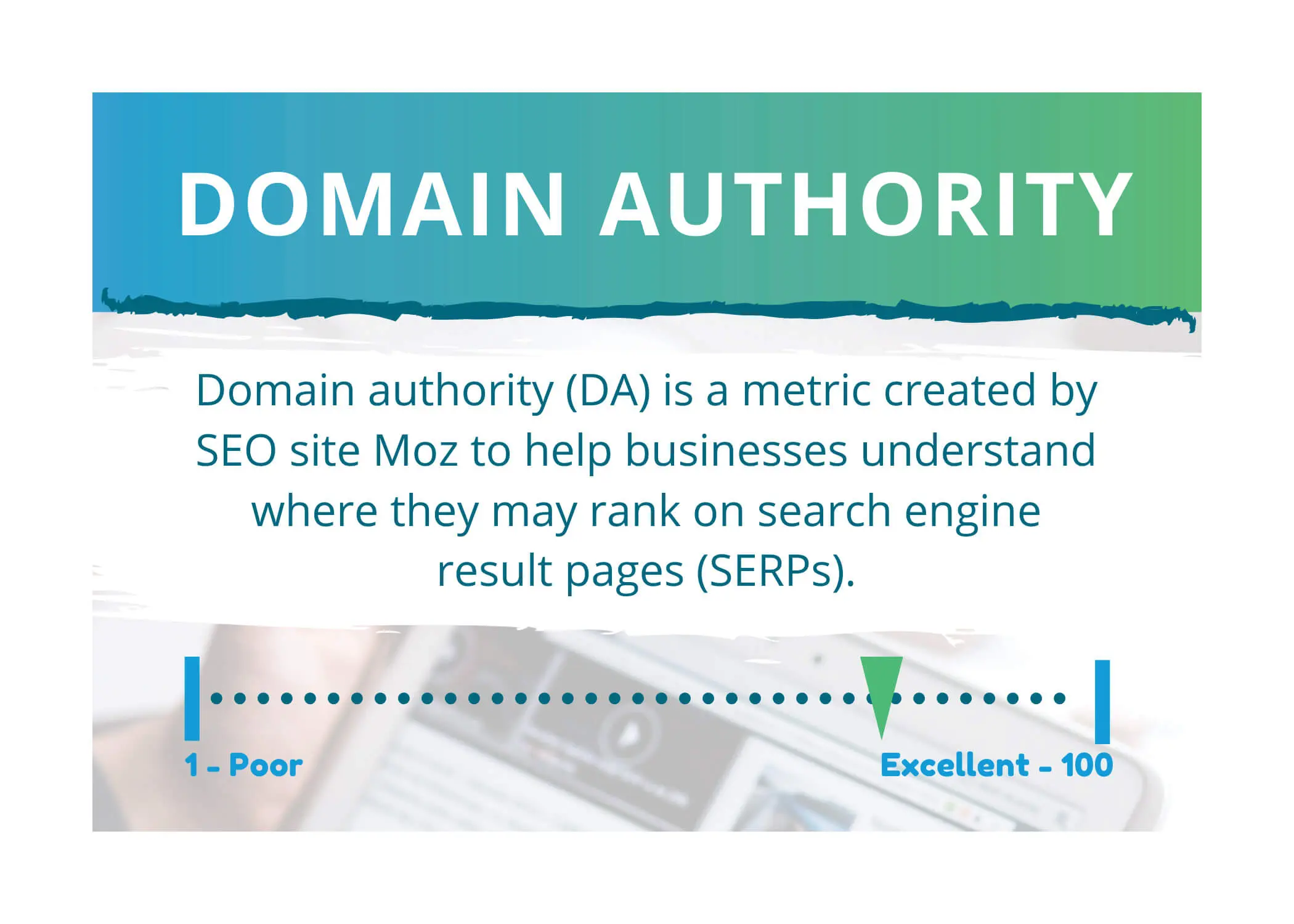
Why Is It Important?
To help your site reach more people, you’ll need to get it higher up the search engine.
Yet, it’s often tricky to gauge exactly how your website’s performing. Even if you think your SEO efforts are on point, your site might not hit those top spots in the SERPs.
In such scenarios, you can use a domain authority (DA) score, often verified using an authority checker for a domain ranking check, to gain a genuine perception of the website’s performance.
Identifying the domain authority can help assess and optimise a website’s search engine ranking score, creating a site that enhances overall SEO and attracts customers and clients. It may even help you figure out the areas that need more improvement.
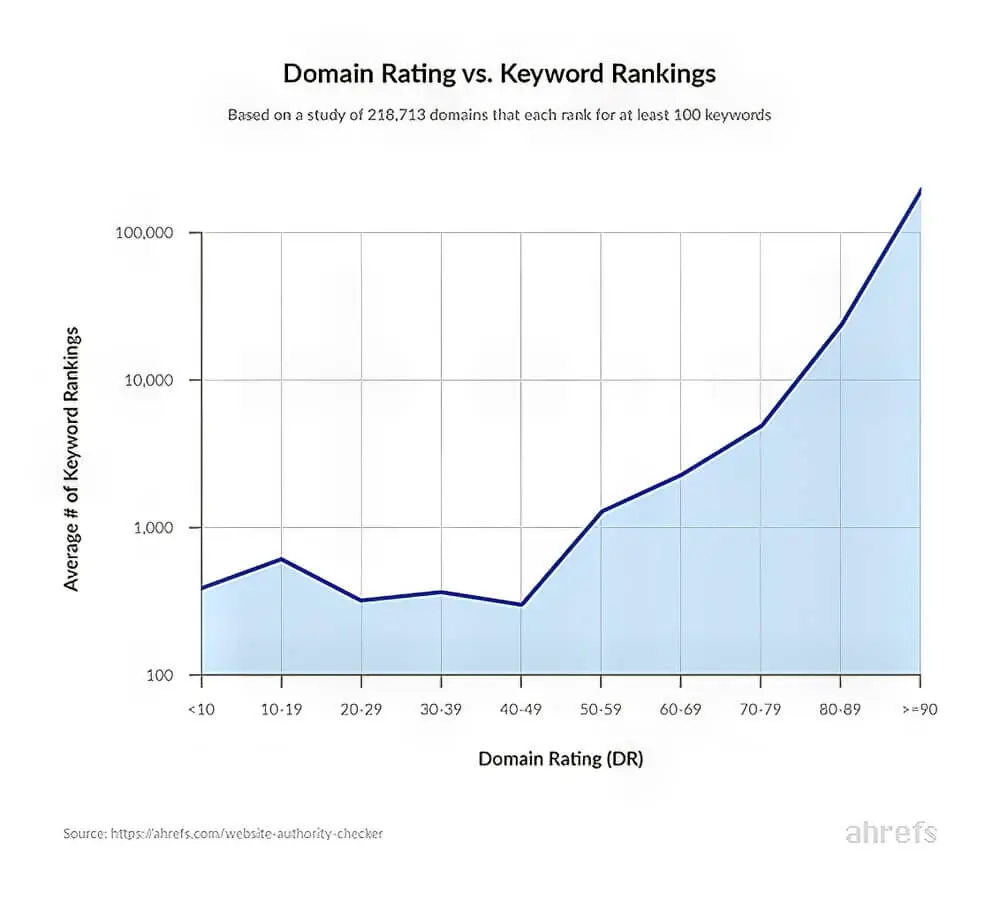
For instance, Google’s page rank algorithms and update methods for deciding how websites are ranked in relation to keywords in the search query are still a mystery. Though it shares some ranking factors and highlights some of the best practises it adopts, it never divulges the exact process of how it ranks the website.
Domain authority accurately represents the search results landscape and can be influenced by Google ranking factors and various domain authority metrics. Hence, it’s a great way to understand how domain authority impacts why you should expect domain performance from specific sites on Google to appear higher up in the SERPs than others.
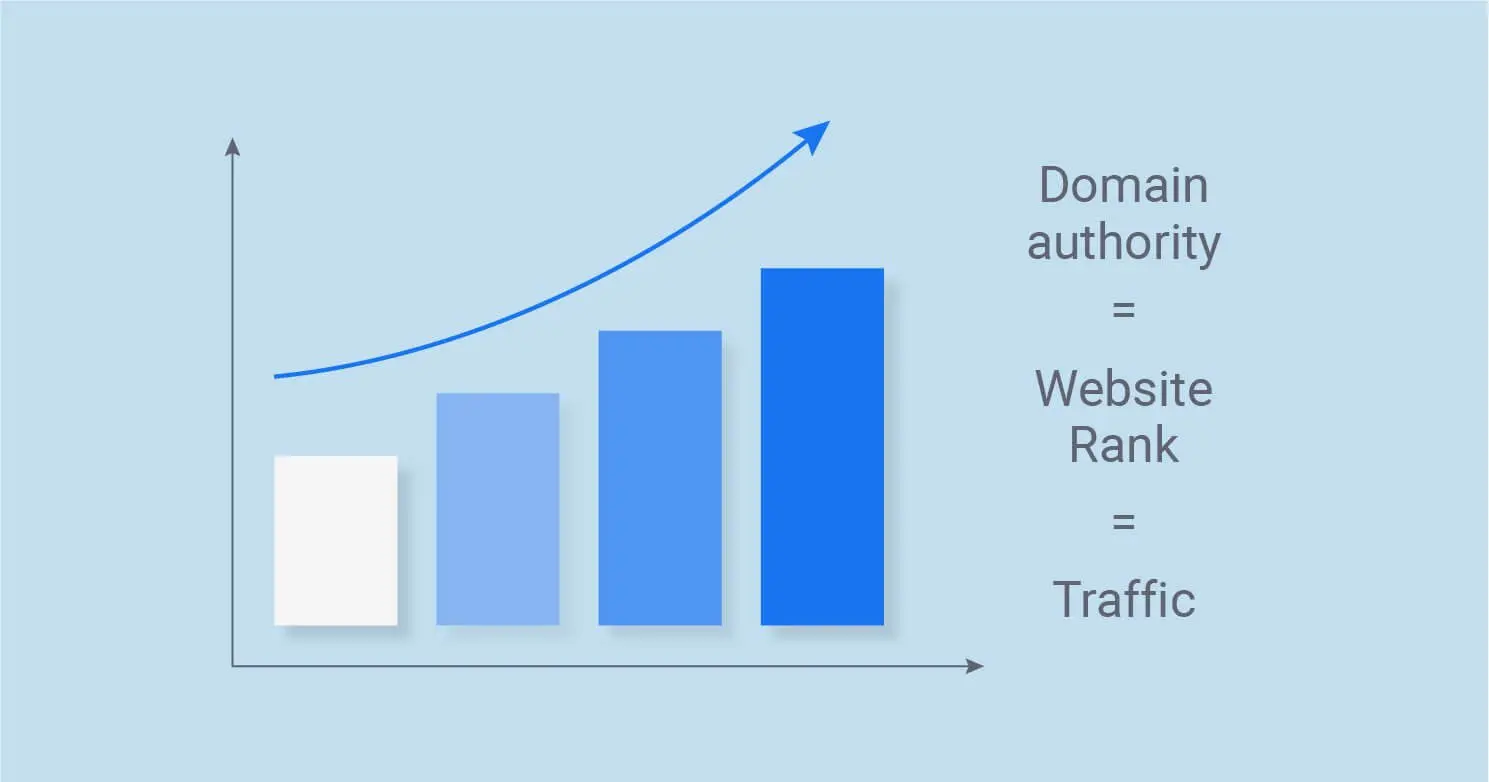
How To Improve Your Domain Authority Score?
Creating a higher DA will take a while when you’ve just registered a domain, especially when compared with established competitors to become stronger than your competitors.
Several factors determine the domain authority score, such as maintaining the website’s content quality, on-page SEO, loading speed, mobile friendliness, and more. However, the link profile is the most crucial requirement for increasing the domain authority score.
The site authority is gauged by the DA score of a website, which is a measurement of the domain strength or weakness of its link profile
.
The growth of a site’s link profile contributes to a higher rank in the SERPs and enhanced search traffic.
Considering these points, here are the methods you can adopt to increase your website’s domain authority score.
1. Minimise Or Eliminate Spammy Links
Earning high-quality links is not the only way to improve domain authority scores; it is the be-all-and-end-all for achieving a good score. It’s also essential to ensure you don’t link your site to many spammy websites.
Thus, it would be best to clean up your site’s link profile periodically using a link audit. You can either refuse to support any such link or remove it manually.
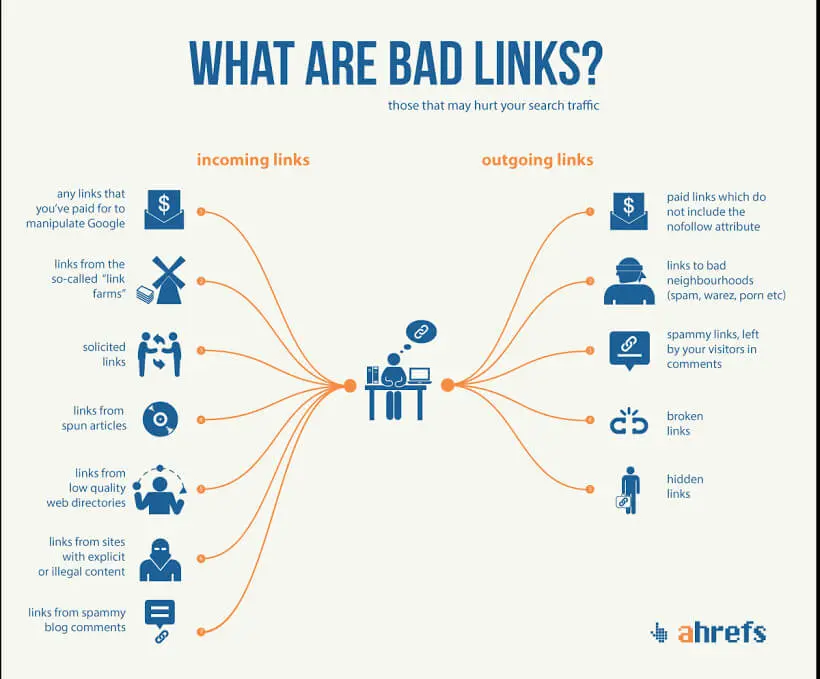
2. Getting Links From Websites With High DA Scores
Incorporating relevant backlinks from high-authority websites and social media platforms is crucial for enhancing your site’s domain authority and improving its web page authority.
There are many ways to achieve obtaining more backlinks and earned links. So, how can you get such authoritative backlinks? One of these is guest posting, which requires you to exchange some content for one backlink, such as a blog post.
Remember that the higher the other website’s DA score, the stronger the backlink will be, and the more link “juice” will be passed onto your site.
3. Getting Links From Authentic Websites
Though many genuine websites have high domain authority in the cyber world, encountering sites faking DA scores can’t be ruled out. The latter entities either try to sell less worthy backlinks at higher prices or come with an excellent yet inactive link profile after the owner ceases to work on them.
As such, some site owners might buy domains like these to build a website network with high domain authority but no traffic. Remember that ineffective link-building strategies are a major red flag when creating a sound link profile.
Tools like Google and Moz are gradually becoming more efficient at identifying websites without attaching value.
The best way to recognise a vital link in today’s cyber world is to check the organic traffic you might get by linking your website to that link.
Factors Used To Determine The Score
The authority metrics of a website are developed by Moz using as many as 40 different factors. Though all cases are not known, understanding what domain authority entails, some of the most significant ones are as follows:
1. Search Engine Friendliness
The user-friendliness and structure of the website are used to determine the site’s search engine friendliness. A site with a poor structure will be complex for Google to crawl through, thus affecting its ranking scores.
2. Linking Root Domains
The number of unique backlinks of a website is its root domain. For instance, if your site has 1000 links from just one website, it will be considered one of the inbound links from a single root domain.
There will be three root domains for a site with three links from three different sites. By earning links from several websites, you can achieve a higher domain authority than by earning a bunch of links from a single website.
3. MozTrust
Moztrust calculates the quality of each backlink, making an in-depth analysis of how closely the website is related to trustworthy ones crucial for link building efforts.
4. MozRank
The total number of links is a critical metric in determining the strength of a website’s backlinks. It takes into account the number of external links on the site, as well as the quality of those links. However, quality is emphasised over quantity, implying that excellent, high-quality external links are more advantageous than several mediocre links.
What Is Domain Rating?
Domain Rating is a ranking metric brought about by Ahrefs that solely determines the quantity and quality of backlinks that your website’s domain has acquired. The domain authority score, measured on a scale of zero to 100, demonstrates the strength of a website’s backlink profile, which can impact its visibility in Google search results.
However, Google doesn’t consider domain ratings to be a ranking factor. That’s why the DR score of the site doesn’t always imply that it will rank in the first position in the Google algorithm.
Instead, the DR is an efficient measure of a website’s link popularity in the industry and its capacity to attract more traffic from a Google Search.
Coming to its calculation procedure, Ahrefs determines the DR of any website using several variables. These include the number of domains with at least one dofollow link to your site, the DR scores of such linking domains, the number of sites every referring domain links to, and many more.
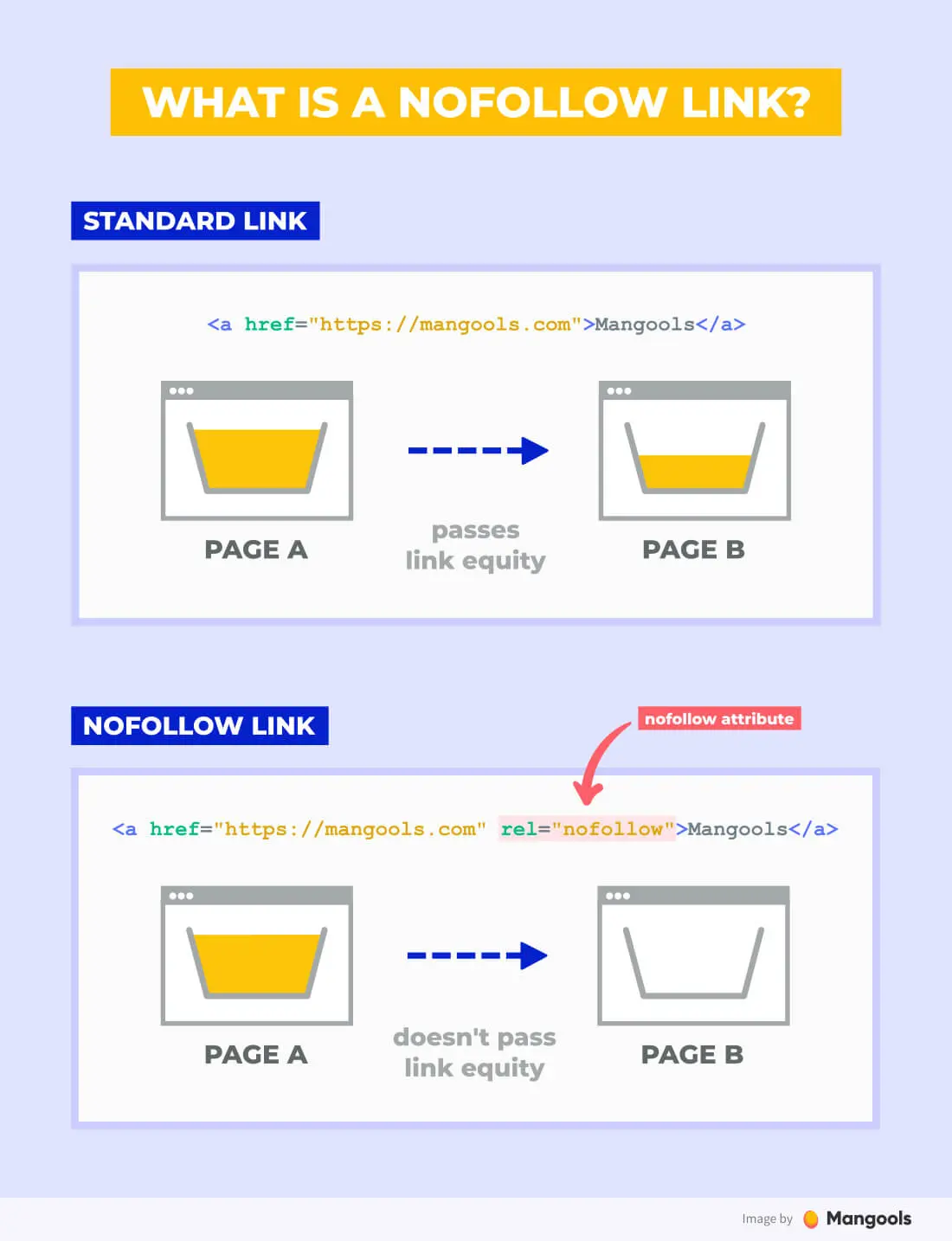
Domain Rating vs Domain Authority
You might’ve understood that a website’s domain authority and domain rating scores impact its overall usability for the target audience. But each of them tells you about a different aspect of its usability. While the domain authority score helps you understand its ranking on SERPs, the DR reveals its link popularity.
Another significant difference is that while the former is calculated using several important factors about a website, the latter is primarily determined using its backlink profile.
How is domain authority calculated?
Domain authority (DA) is a metric that measures a website’s strength and credibility. It is calculated based on several factors, including the age of the domain, the number and quality of links pointing to the website, the quality and relevance of the website’s content, and the website’s performance in terms of speed and usability.
The domain authority score is calculated on a scale of 0 to 100, with higher scores indicating a stronger and more credible website. It is important to incorporate domain age as domain authority is not a ranking factor used by search engines but rather a third-party metric used to predict how well a website is likely to perform in search results.
If you’re curious about checking a website’s domain authority, there are plenty of tools at your disposal. Moz’s free Domain Authority tool and Ahrefs’s Domain Rating are just a couple of popular options.
These tools use different algorithms and data sources to calculate domain authority, so the scores may vary slightly between them.
To improve a website’s domain authority, it is crucial to focus on factors such as Building high-quality backlinks and relevant content, creating and promoting high-quality and relevant content, and optimising the website for speed and usability. By doing so, businesses can increase their website’s credibility and visibility in search results.
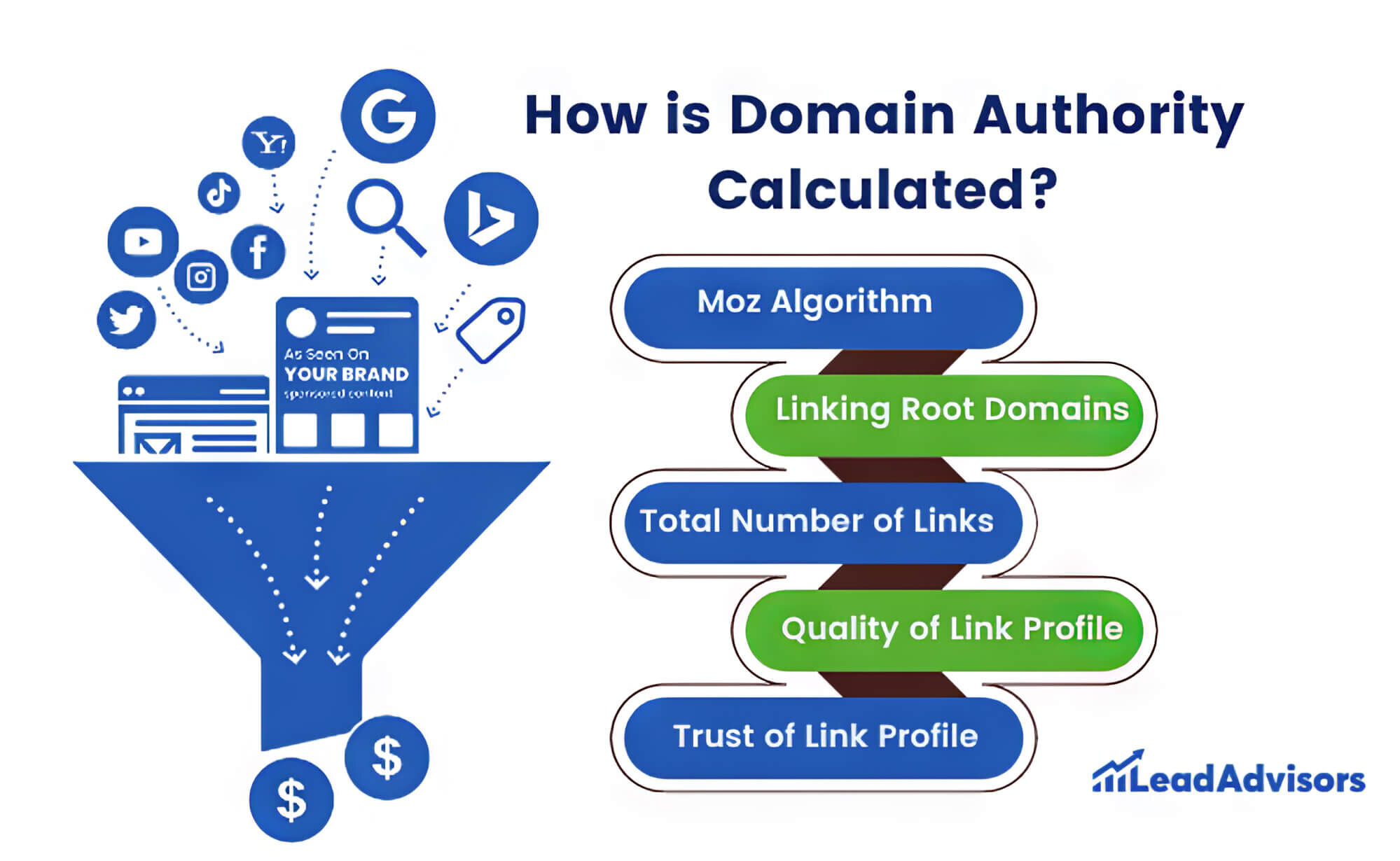
How To Get A Good Domain Rating?
You can enhance the domain rating by building more “followed” links to the site. That said, it’s equally important to ensure that you don’t build links to random pages that aren’t up to the mark in terms of quality. That’s because it might not always help increase the organic traffic on your site.
As described below, you must adopt three efficient yet straightforward methods to improve a website’s DR.
1. Pitching Relevant And Authoritative Websites
If you want other people to link to the website content that is relevant to theirs, you must let the site owners know about it. Thus, it’s important to pitch your website content to relevant and authoritative websites.
But how can you find relevant contacts to do the same?
At the start, we’d suggest going through these groups:
- People featured in the articles on your site
- Authors of similar articles
- People who’ve linked to similar articles
An effective way of reaching out to such people is by sending them personalised emails. In these emails, you can request that they link to your website and talk about it. The text of the emails should give some value to the targeted prospects, making them seem relevant, engaging, and worthwhile.
2. Create Content That Others Want To Link To
You must consider some important points to create high-quality content that other website owners will want to link to.
Firstly, you must ensure that the content doesn’t seem too commercial. The owners of relevant, high-quality websites will likely choose content that’s not just targeted toward making money. Another significant aspect to consider is the utility of the content, as you should always create something constructive for people engaged in relevant fields.
Last but not least, your content’s topic must have many referring domains to the top-ranking sites, which translates to a history of getting links.
Increasing Your Domain Authority
Now that you’ve learned domain authority and several other related concepts and factors, it’s time to use them wisely to improve your website’s overall reach.
But before we call it a day, here’s a last piece of advice so you can proceed correctly. Ensure you never merely take metrics like DA and DR as ranking factors. Instead, using them to create robust linking strategies and measure the SEO efforts you’ve invested in would be best. Also, consider improving your internal linking profile to boost authority scores and build your website’s authority and SERP ranking.
At sitecentre®, we have worked with clients for many years, developing sea strategies and delivering excellent search engine optimisation and link-building results with in-house SEO tools. Contact us for more information on your website’s domain authority or your domain score!
That’s a wrap for today. Catch you next time, and take care!

